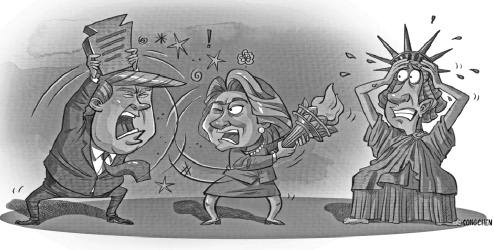
The United States will go to the polls to elect a new president on Tuesday. But whether Democrat Hillary Clinton or Republican Donald Trump wins the election, one thing is certain--that the presidential election campaign has widened the rift in American society.
Public discontent has become more obvious, and some commentators believe the election is not about the Democratic Party versus the Republican Party, but about the grassroots versus the elite. Trump and Bernie Sanders (who lost the Democratic race to Clinton) were in the headlines because Sanders belongs to the left and Trump to the right. Neither represents the mainstream American society, though.
Saunders advocated reforming the Wall Street-controlled financial system, raising the minimum wage, raising taxes for the rich, making college education free, promoting universal healthcare and opposing the consortium's use of money power to intervene in elections. And he was supported by young American voters.
On the other hand, Trump's supporters are mostly white blue-collar workers who are not protected under affirmative action. Since the global financial crisis the social status of such workers has deteriorated, and studies show the decline of white Americans has accelerated over the past 15 years.
Money politics is another issue in this election. After the Watergate scandal, the U.S. imposed a number of restrictions on political contributions to limit the spread of black money, fixing the ceiling at $123,200.
But on April 2, 2014, the U.S. Supreme Court ruled there would be no ceiling on political campaign contributions. After the limit was removed, American democracy tilted toward money power.
So even if any U.S. citizen can run for presidency in principle, only the rich or the politicians supported by large monetary contributions can be nominated.
Another issue exposed by this election campaign is the resurgence of racial conflict. Barack Obama is the first black president of the U.S., but during his term racial conflicts have actually increased, with police being accused of inflicting violence on blacks. Besides, the poverty rate among blacks is now almost double that among whites, according to research by Brookings Institution. So it would not be an exaggeration to say the U.S. is experiencing the most serious racial crisis since the civil rights movement of the 1960s.
Immigration and its impact on mainstream American culture is another major issue thrown up by this election campaign. Trump has been tough on the immigration issue, and his racist rhetoric has violated the bottom line of religious tolerance and cultural diversity of the U.S.. But some Americans are indeed worried about the influx of illegal immigrants into the U.S. and the social problems they could create.
Manipulations in elections are contrary to the spirit of democracy, but this election has exposed some political conspiracies. For one, the tens of thousands of emails from the Democratic National Committee released by WikiLeaks during the primaries exposed top Democrats' efforts to "sideline" Sanders and manipulate the election.
Moreover, "Oath Keepers", a militia group of heavily armed white men, has asked its members to patrol outside polling stations on election day to prevent voter fraud, The Washington Post said on Oct 28, 2016. The Oath Keepers comprises mostly retired police officers, veterans and retired military personnel. And although they claim to be non-partisan, they are mostly Trump supporters. This is shocking in a mature democracy.
Worse, Trump's supporters have warned that "if Trump is defeated, it will lead to a revolution". This has prompted elites to analyze the U.S. democratic system and researchers to discuss the rise and fall of the U.S..
The real message of this election, therefore, is that American democracy has finally begun to respond to the widening wealth gap.
The old topic of "class" has returned to the center of American politics, so the new U.S. president has to face the reality of repairing the problem of democracy in the country.
By Zhao Mei
The author is a senior fellow at the Institute of American Studies, Chinese Academy of Social Sciences, and the managing editor of the Chinese Journal of American Studies.


















































